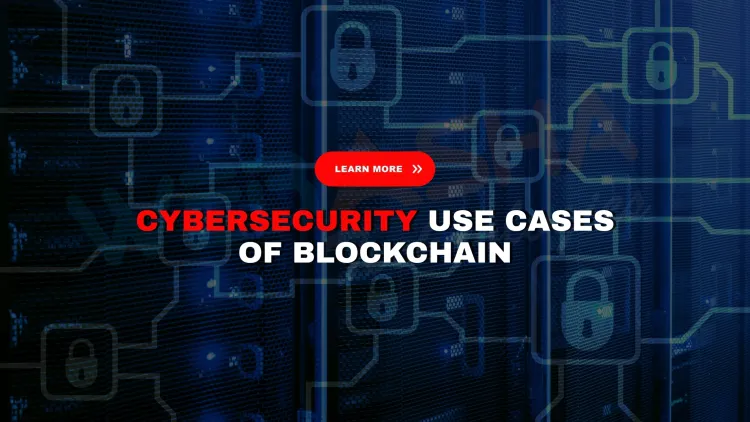What are the cybersecurity use cases of blockchain beyond cryptocurrency in 2025?
In 2025, blockchain technology has moved far beyond its cryptocurrency roots to become a critical tool in modern cybersecurity. With use cases ranging from secure identity management and supply chain verification to tamper-proof logging and IoT device security, blockchain provides transparency, integrity, and trust in digital interactions. Its decentralized nature minimizes single points of failure, while cryptographic validation ensures data authenticity. This makes blockchain a powerful ally in combating cyber threats, enhancing regulatory compliance, and fortifying digital infrastructure across industries.

Table of Contents
- What Is the Role of Blockchain in Cybersecurity Today?
- Why Is Blockchain Considered Secure?
- Key Use Cases of Blockchain in Cybersecurity (2025)
- Benefits of Integrating Blockchain with Cybersecurity
- Challenges in Blockchain-Based Cybersecurity
- Blockchain and AI in Cyber Defense
- Sectors Benefiting Most from Blockchain in Cybersecurity
- What to Expect in the Future?
- Conclusion
- Frequently Asked Questions (FAQs)
What Is the Role of Blockchain in Cybersecurity Today?
Blockchain, once synonymous with cryptocurrencies like Bitcoin and Ethereum, has now evolved far beyond digital currencies. In 2025, cybersecurity professionals are increasingly adopting blockchain technology to secure data, prevent fraud, and ensure system integrity. With its decentralized, immutable, and transparent nature, blockchain is becoming a crucial weapon in the fight against evolving cyber threats.
Why Is Blockchain Considered Secure?
The core principles of blockchain—immutability, transparency, and decentralization—make it naturally resistant to tampering and cyberattacks. Every transaction is recorded across multiple nodes, making it nearly impossible for a hacker to alter records without consensus from the entire network. This eliminates single points of failure and enhances trust among users.
Key Use Cases of Blockchain in Cybersecurity (2025)
1. Decentralized Identity Management (DID)
Blockchain enables users to control their own digital identities without relying on centralized databases. This drastically reduces the risk of data breaches and identity theft.
2. Secure IoT Device Communication
With billions of IoT devices in operation, security is a growing concern. Blockchain ensures secure communication and firmware updates through trusted distributed ledgers, reducing vulnerabilities in smart devices.
3. Supply Chain Integrity and Verification
Cybersecurity threats can target hardware supply chains. Blockchain allows organizations to track and verify every step in a supply chain, ensuring no tampered components enter mission-critical systems.
4. Data Integrity and Anti-Tampering Mechanisms
Sensitive data such as medical records or legal documents can be hashed and stored on a blockchain. Any change to the original file would not match the hash, immediately signaling tampering.
5. Smart Contracts for Automated Security Policies
Smart contracts can automate responses to cybersecurity threats. For instance, if a data breach is detected, a smart contract could revoke access rights or initiate an investigation automatically.
6. Decentralized Public Key Infrastructure (DPKI)
Traditional PKI systems rely on centralized certificate authorities. Blockchain replaces this with a tamper-resistant, decentralized solution, making man-in-the-middle attacks far less effective.
7. Anti-Ransomware Strategies
Blockchain-based backups and validation mechanisms ensure that files can be restored and verified even after a ransomware attack, minimizing the impact and reducing downtime.
Benefits of Integrating Blockchain with Cybersecurity
| Feature | Traditional Cybersecurity | Blockchain-Enhanced Security |
|---|---|---|
| Data Integrity | Relies on backups & checksums | Immutable ledger ensures trust |
| Authentication | Centralized (vulnerable) | Decentralized, user-controlled |
| Attack Surface | Centralized systems are risky | Distributed networks reduce risks |
| Access Control | Role-based, may be outdated | Smart contracts can auto-enforce rules |
| IoT Protection | Weak & fragmented | Secured via device registries & chains |
Challenges in Blockchain-Based Cybersecurity
While blockchain offers enormous potential, there are hurdles:
-
Scalability Issues: Public blockchains can be slow.
-
Regulatory Uncertainty: Data storage on immutable ledgers can conflict with privacy laws like GDPR.
-
Complex Implementation: Requires skilled developers and secure infrastructure.
-
Cost: Deploying and maintaining blockchain networks can be expensive.
Blockchain and AI in Cyber Defense
The convergence of AI and blockchain is unlocking real-time threat detection systems that are transparent and traceable. AI can analyze patterns, while blockchain ensures the data used for training or decision-making is trustworthy and unaltered.
Sectors Benefiting Most from Blockchain in Cybersecurity
-
Healthcare: Protecting medical data and ensuring HIPAA compliance.
-
Banking: Fraud detection and secure identity verification.
-
Defense and Military: Securing mission-critical systems and supply chains.
-
Education: Validating academic credentials and certificates.
-
Smart Cities: Managing secure data from sensors, traffic systems, and public utilities.
What to Expect in the Future?
By 2025, blockchain’s integration into cybersecurity will move from being experimental to mainstream. Governments and enterprises are already deploying pilot programs. The future could include:
-
Interoperable blockchain security standards
-
Blockchain-based zero trust architectures
-
Greater use of consortium blockchains for industry-specific security frameworks
Conclusion
Blockchain is no longer just the foundation of cryptocurrencies—it’s quickly becoming the backbone of next-generation cybersecurity systems. As cyberattacks grow more advanced, blockchain's transparent and decentralized architecture offers a resilient defense strategy. In 2025, organizations that combine blockchain with traditional cybersecurity tools and AI will have the upper hand in securing their digital ecosystems.
FAQs
What is the role of blockchain in cybersecurity?
Blockchain ensures data integrity, transparency, and immutability, helping prevent tampering, fraud, and unauthorized access across digital systems.
How does blockchain go beyond cryptocurrency?
Blockchain now powers use cases like secure identity verification, data integrity in healthcare, IoT security, and regulatory compliance outside of financial applications.
Can blockchain prevent ransomware attacks?
While blockchain doesn't directly stop ransomware, it can protect critical systems by decentralizing data and creating immutable logs for attack forensics.
What are the top cybersecurity use cases of blockchain in 2025?
Some key use cases include decentralized identity management, secure voting systems, tamper-proof logs, IoT device protection, and smart contract enforcement.
Is blockchain effective for digital identity verification?
Yes, blockchain provides decentralized, cryptographically secure identity systems that prevent identity theft and unauthorized access.
How does blockchain enhance IoT security?
Blockchain secures IoT ecosystems by authenticating devices, recording interactions immutably, and enabling automated smart contracts.
What is tamper-proof logging in blockchain?
It refers to storing logs on blockchain where once a log is recorded, it cannot be changed, ensuring transparent and trusted audit trails.
Does blockchain help with compliance in cybersecurity?
Yes, its transparency and verifiability make it easier to meet regulatory standards such as GDPR, HIPAA, and PCI DSS.
How do smart contracts help in cybersecurity?
Smart contracts automate security enforcement, reduce human errors, and ensure pre-defined rules are always executed without tampering.
Is blockchain scalable for enterprise cybersecurity?
Modern blockchain platforms offer scalable solutions with sidechains and Layer 2 protocols for large-scale cybersecurity needs.
Can blockchain be used in cloud security?
Yes, blockchain is used for verifying access logs, ensuring data integrity, and securing cross-cloud communications.
What industries use blockchain for cybersecurity?
Finance, healthcare, supply chain, education, and government sectors increasingly adopt blockchain to secure data and operations.
Is blockchain useful in detecting insider threats?
By maintaining immutable audit logs and access records, blockchain helps detect and trace insider activities reliably.
What are zero-knowledge proofs in blockchain security?
These are cryptographic techniques used in blockchain to verify data without revealing the data itself, improving privacy and security.
Can blockchain secure academic credentials?
Yes, blockchain stores academic records immutably, making it impossible to forge certificates or degrees.
How does blockchain help in securing software supply chains?
Blockchain enables end-to-end traceability of software components, preventing tampering and unauthorized changes.
Is blockchain used in military or defense cybersecurity?
Yes, blockchain is explored for securing communication, authentication, and logistics in defense systems.
Can blockchain replace traditional cybersecurity tools?
No, but it complements existing tools by adding layers of transparency, immutability, and decentralized control.
What are some blockchain platforms focused on security?
Platforms like Hyperledger Fabric, Ethereum, and Algorand offer strong security features for enterprise use.
How does blockchain support secure voting systems?
By recording votes immutably and transparently, blockchain ensures election integrity and prevents fraud.
Are blockchain logs admissible in court?
In many jurisdictions, blockchain logs are considered valid evidence due to their tamper-proof nature.
What is decentralized cybersecurity?
It refers to securing systems without a single point of failure, which blockchain enables through its distributed architecture.
Can blockchain help prevent phishing?
While not a direct solution, blockchain can be used to validate websites and digital identities to prevent phishing attacks.
What is the future of blockchain in cybersecurity?
The future includes integration with AI, automation, real-time threat sharing, and global decentralized security platforms.
How is blockchain used in endpoint security?
It helps track endpoint interactions, verify software integrity, and enforce automated security policies.
Can blockchain improve email security?
Yes, by validating sender identities and logging communication history immutably, email spoofing can be reduced.
How does blockchain support forensic investigations?
Blockchain provides secure, unalterable logs that can be used as digital evidence in forensic audits.
What are the benefits of blockchain in disaster recovery?
Blockchain ensures data redundancy and availability across decentralized nodes, aiding in faster recovery.
Can blockchain secure passwords and credentials?
Yes, by replacing them with decentralized identifiers (DIDs) and cryptographic keys stored securely.
Is blockchain compatible with existing cybersecurity frameworks?
Yes, blockchain can be integrated with frameworks like NIST, ISO/IEC 27001, and more for enhanced compliance.













![Top 10 Ethical Hackers in the World [2025]](https://www.webasha.com/blog/uploads/images/202408/image_100x75_66c2f983c207b.webp)









